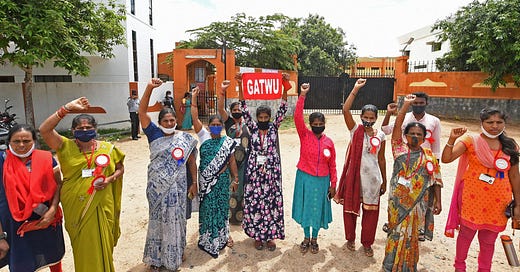Why Does Fashion Keep Getting Away With Wage Theft?
Garment workers making clothing for popular brands say they can't feed their children.

“If you don’t like it, you can leave.” This phrase, retold to The Guardian by a garment worker in India who heard it from her boss this year, is one of the most common sentences in fashion. Hundreds of thousands of garment workers around the world are told some iteration of this compassionless response when they try to fight for even the most basic rights, like minimum wage. Specifically, this particular garment worker was referring to factories in Karnataka where she and her colleagues say they have not been paid a full wage since the beginning of the pandemic. “Throughout this year I have only fed my family rice and chutney sauce,” she said, speaking about how the change in her take-home pay has made it so she cannot feed her children.
In the start of the pandemic, factories took a hit when brands canceled already-made orders and refused to pay. Many of these manufacturers then turned the financial burden onto the garment workers, making them do the same job for half the pay. Even though orders have come back around, the pay has remained far less than the legal minimum wage. According to the WRC, this is one of the worst cases of wage theft they have ever seen at an estimated £41 million in stolen pay.
Brands like Nike, H&M, and Zara all responded to The Guardian’s report with some quote along the lines of “we don’t accept this kind of behavior in the supply chain and we have made it clear they need to pay.” However, this doesn’t change the fact that it's happening. Wage theft is one of the most pervasive issues in fashion simply because brands do not have as much control of their suppliers as they claim. This practice can come in many different forms: cutting wages and never paying them back, forcing workers to clock out and work overtime without pay, or even forcing workers to pay back wages earned. All of them have the same result, though. Workers are making our clothing for so little money they can’t even eat a proper meal.
As consumers, it’s difficult to know how to fix this problem – and often, bad press and small boycotts are only enough to garner a response and a promise. A good example is what happened in Los Angeles earlier this year. Workers there won a long-fought victory against wage theft when the state legislature passed SB62, a bill that makes the pay-per-piece model illegal. Manufacturers now have to pay the legal minimum wage to all workers in the city, and cannot get away with paying low wages based on the amount of product produced. Across the world, however, the legal enforcement of wage theft needs to fall on the brands. If having control of the supply chain is something they can use as a response when bad press comes in regarding their manufacturers, then they should be held legally responsible when it’s found that wages are being stolen.



